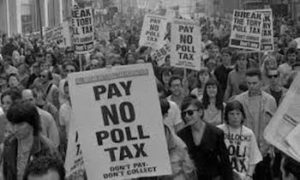
*On this date in 1937, Breedlove v. Suttles, 302 U.S. 277 (1937), was decided. This case was an overturned United States Supreme Court decision that upheld the constitutionality of requiring the payment of a poll tax to vote in state elections.
At the time, Georgia imposed a poll tax of $1.00 per year, generally levied on all inhabitants. The statute exempted the tax of anyone under 21 or over 60 and all females who do not register to vote. Under the state constitution, the tax must be paid by the person liable, together with arrears, before he can be registered for voting.
Nolan Breedlove, a white male, 28 years of age, declined to pay the tax and was not allowed to register to vote. He filed a lawsuit challenging Georgia law under the Fourteenth (Equal Protection Clause and the Privileges and Immunities Clause) and the Nineteenth Amendment. T. Earl Suttles was named defendant in the case in his official capacity as a Fulton County, Georgia, tax collector. Justice Butler delivered the unanimous opinion of the court.
Associate Justice Pierce Butler delivered the court's opinion, which unanimously upheld the Georgia law. Concerning the differential treatment of men and women under the law, the court held that differences between women and men allowed for special consideration to be given to women: The tax being upon persons, women may be exempted based on unique reviews to which they are naturally entitled. Given their burdens to preserve the race, the State reasonably may exempt them from poll taxes.
Concerning the age discrimination claim, the court held that the upper age limit to the tax was like exemptions by age given for military or jury service. About the Nineteenth Amendment, the court dismissed that the tax was "to deny the right of men to vote on account of their sex." Georgia abolished its poll tax in 1945. This decision remained precedent until 1966, when the Supreme Court reversed it in a 6–3 decision in Harper v. Virginia State Board of Elections. Two years earlier, the 24th Amendment had been ratified, prohibiting using the poll tax (or any other tax) as a precondition for voting in federal elections. Justice Hugo Black, who participated in the Breedlove and the Harper decision, dissented from the decision declaring the poll tax unconstitutional.